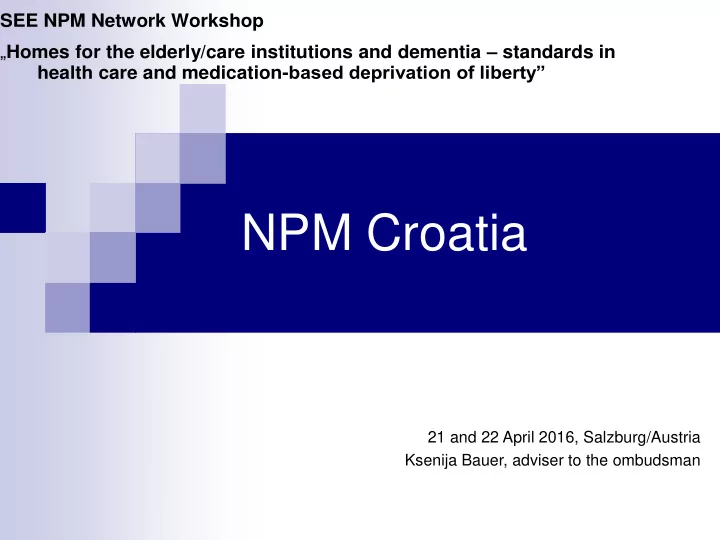

SEE NPM Network Workshop „ Homes for the elderly/care institutions and dementia – standards in health care and medication- based deprivation of liberty” NPM Croatia 21 and 22 April 2016, Salzburg/Austria Ksenija Bauer, adviser to the ombudsman
What are the focal points of NPM's visit to such institutions? Purpose of visits was to establish quality of living conditions of persons in stationary placement, the manner in which personnel treat residents legal grounds for placement in an institution, whether their specific needs, that is, respect of their fundamental rights and freedoms are being met like their right to be informed; right to respect of private and family life; protection of right to liberty; prohibition of torture, inhumane or degrading treatment; providing an adequate expert treatment; right to submit complaints and right to property.
Special attention is paid to situations which might constitute restriction of freedom of movement. During visits to homes for elderly we haven’t identify actions which might constitute torture and inhumane treatment however, we have established some behaviour which might constitute degrading treatment and violation of single personal legal rights.
Reasons for that mainly derive from poor knowledge on international standards and - regulations which in domestic legal system regulate rights of persons placed in institutional care, from paternalistic attitude on behalf of personnel who - pretend to know best what their users need, or, due to a lack of personnel. -
Individual employees communicated with older persons like as with children, which some persons experienced as degrading. In order to prevent violation of residents’ rights we have recommended organisation of trainings on human rights of elderly persons for all employees of social care homes.
3-5 frequently detected , serious problems in such institutions All visited social care homes are clean and tidy, and accommodated persons in general praise the manner in which expert personnel treat them. Out of seven homes we visited in one private home the rights of accommodated older persons are respected to the highest extent so that it might largely represent an example of good practice.
One of the problems is the level of respect for the autonomy of residents. From the interviews with the residents it is evident that they frequently are not enough informed about their rights and about homes’ decisions which directly or indirectly relates to them.
In some homes application for accommodation and contracts thereof sign family members, that is, those who are obliged to pay, and not an older person in some homes residents are not encouraged to get out from bed and residents who have mobility problems may spend all time in bed while in other homes practise is to encourage all residents to spend less time in bed during the day; so that they are being carried onto the wheel chairs and driven to the common premises in order to participate in organised activities for leisure.
For personal wellbeing it is very important that a person does not stay all the time in bed during the daylight, instead, according to her/his interests, participation in different activities and socialising with others, is highly recommended.
Special attention was paid to the manners in which personal privacy and dignity is respected while nursing the users in their rooms or bathrooms; so that some homes, where encountered irregularities (like, open door during nursing; room-dividers not used in multiple rooms and similar) were immediately warned thereof.
Medication-based restrictions to freedom: definition, practical experience During our visits we haven’t had in focus medication - based restrictions to freedom. But, we are particularly paying attention to whether the residents agree to medication. In all seven homes psychopharmacies are prescribed by psychiatrists and no case of over sedation was observed. No-one complained that he/she was forced to take pills.
Hence, not in a single home a data on usage of personal restraint measures were received also. They are applied under strict supervision of medical workers only for fixation of one hand in course of receiving infusion; as well as measures for prevention of falling out of wheel chairs if a person is not able to sit on her/his own. In the stationary section with agitated persons, mainly during the night, side parts of bed are uplifted in order to prevent falling out of bed.
Recommend
More recommend